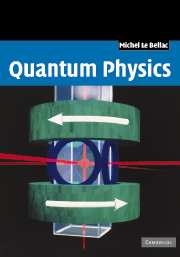Book contents
- Frontmatter
- Contents
- Foreword by Claude Cohen-Tannoudji
- Preface
- Table of units and physical constants
- 1 Introduction
- 2 The mathematics of quantum mechanics I: finite dimension
- 3 Polarization: photons and spin-1/2 particles
- 4 Postulates of quantum physics
- 5 Systems with a finite number of levels
- 6 Entangled states
- 7 Mathematics of quantum mechanics II: infinite dimension
- 8 Symmetries in quantum physics
- 9 Wave mechanics
- 10 Angular momentum
- 11 The harmonic oscillator
- 12 Elementary scattering theory
- 13 Identical particles
- 14 Atomic physics
- 15 Open quantum systems
- Appendix A The Wigner theorem and time reversal
- Appendix B Measurement and decoherence
- Appendix C The Wigner–Weisskopf method
- References
- Index
7 - Mathematics of quantum mechanics II: infinite dimension
Published online by Cambridge University Press: 05 January 2013
- Frontmatter
- Contents
- Foreword by Claude Cohen-Tannoudji
- Preface
- Table of units and physical constants
- 1 Introduction
- 2 The mathematics of quantum mechanics I: finite dimension
- 3 Polarization: photons and spin-1/2 particles
- 4 Postulates of quantum physics
- 5 Systems with a finite number of levels
- 6 Entangled states
- 7 Mathematics of quantum mechanics II: infinite dimension
- 8 Symmetries in quantum physics
- 9 Wave mechanics
- 10 Angular momentum
- 11 The harmonic oscillator
- 12 Elementary scattering theory
- 13 Identical particles
- 14 Atomic physics
- 15 Open quantum systems
- Appendix A The Wigner theorem and time reversal
- Appendix B Measurement and decoherence
- Appendix C The Wigner–Weisskopf method
- References
- Index
Summary
In Chapter 4 we saw that the canonical commutation relations force us to use a space of states of infinite dimension, in which rigor would require the use of advanced mathematical tools. Fortunately, physicists generally need only to carry the results for finite dimension over to infinite dimension with some simple modifications which we shall indicate here, without embarking on sophisticated mathematics. Nevertheless, it is useful to be aware of the lapses in rigor which are customarily made in physics in order to avoid possible unpleasant surprises.
The objective of this chapter is, on the one hand, to present some concrete examples illustrating the new features which arise in infinite dimension and, on the other, to give the rules for practical calculations, in particular to write down the spectral decomposition of Hermitian and unitary operators. The mathematics we use is a bit more detailed than commonly found in most quantum mechanics textbooks. The reader interested purely in the practical aspects can proceed directly to Section 7.3, where the results essential for later on are summarized.
Hilbert spaces
Definitions
The space of states of quantum mechanics is a Hilbert space ℌ, which in general is of infinite dimension. The axiomatic definition of a Hilbert space is the following.
It is a vector space which, for the needs of quantum mechanics, is defined on complex numbers. The vectors of this space are denoted |ϕ〉.
[…]
- Type
- Chapter
- Information
- Quantum Physics , pp. 209 - 221Publisher: Cambridge University PressPrint publication year: 2006



